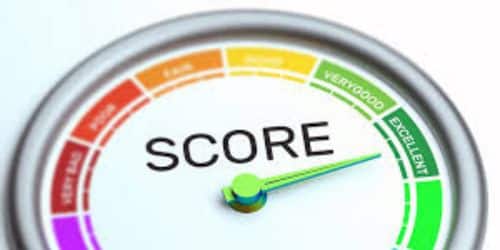Even the most financially savvy individuals can be perplexed by credit scores. Most people understand that having a good credit score increases your chances of qualifying for a mortgage by demonstrating to the lender that you are likely to repay your loan on time. This is why many lenders have minimum credit score requirements for the loans they provide. But do you know what your credit score must be in order to qualify for a mortgage and purchase a home? However, if you need financing, as most ambitious American homeowners do, your credit score will not be an issue. In this post, we will talk about the low, minimum, and best ideal credit score for home loans.
Credit Score for Home Loan
Because a mortgage is often the largest loan you will take out in your lifetime, lenders require a minimum credit score for mortgages. A good credit score indicates to lenders that you will be able to complete your payments on time. If your credit is less than stellar, you still have mortgage options. However, if your credit score is higher, you will typically be eligible for more loan options and lower interest rates. The credit score criteria vary depending on the lender and the type of loan. Conventional loans, for example, often have a higher credit score requirement than government-backed loans insured by the Federal Housing Administration.
You may be asking how lenders determine your credit score before we get into the credit score you need to qualify. After all, three distinct bureaus publish your FICO® Score. When you apply for a loan on your own, lenders obtain your credit score from each of the three main credit bureaus and use the middle or median number to qualify you. If a loan has two or more borrowers, the lowest median score across all mortgage clients is often regarded as the qualifying score.
Once you understand what credit score is required for each sort of loan, it’s time to analyze your own score. That entails reviewing your credit report. Your credit report, which describes your credit history, is an important aspect of understanding your credit score. Any error on this report could lower your score, so make it a routine to check your credit report at least once a year and report any problems to the credit reporting agency as soon as you find them. You are entitled to a free credit report from each of the three major credit reporting agencies once a year.
Low Credit Score for Home Loans
According to Bruce McClary, senior VP of communications at the National Foundation for Credit Counseling, “a low credit score can make it less likely that you will qualify for the most affordable rates, and may even result in the rejection of your mortgage application.” “With a low credit score, you can still be approved, but you may need to add a co-signer or reduce the total amount you plan to borrow.”
#1. Ally Bank
For qualifying customers, Ally provides a variety of loan alternatives, the majority of which have competitive interest rates. This offers low-down-payment lending choices for first-time borrowers. Ally’s application procedure is completely digital, and loan approvals are completed faster than most competitors. Unfortunately, there are no government-backed loans available. Those looking for simple qualification criteria may not have as many possibilities. Borrowers with strong or exceptional credit who want to apply online for a fixed-rate, adjustable-rate (ARM), or jumbo loan are a good fit for this mortgage provider. Ally does not have many mortgage options for borrowers with poor credit. That implies you won’t be able to find the following government-backed loans, which have less stringent eligibility requirements:
- FHA financing
- USDA financing
- VA Loans
For those that qualify, Navy Federal Credit Union (NFCU) offers great mortgage rates. If you are a member of the military or the Department of Defense (or if you are a family member or share a household with someone who is), NFCU should be on your shortlist when looking for a mortgage. In addition to low prices, Navy Federal consistently ranks highly in customer satisfaction surveys. This mortgage lender is ideal for any qualifying United States service member looking for a mortgage. Navy Federal offers incredibly low mortgage interest rates to the military community, as well as a special lending program for persons who have exhausted their VA mortgage benefits.
Minimum Credit Score for Home Loan
The minimum credit score for home loans required to qualify for a mortgage depends on the type of loan you utilize and the lender you apply to. As previously stated, a credit score of 620 is normally required for a conventional mortgage, although you may be able to acquire financing with a lower credit score. If your credit score is 580 or better, you may be able to qualify for an FHA loan with Rocket Mortgage. Below is the list of minimum credit score for a home loan:
#1. FHA Loan
The Federal Housing Administration insures FHA home loans, making them less risky for lenders and, as a result, easier to qualify for than conventional mortgages. They also provide down payments as low as 3.5% and low-equity refinances that allow you to refinance up to 97.75% of the value of your house. Borrowers with low credit ratings or those who spend a considerable amount of their income on housing may benefit from FHA loans. Current homeowners who are underwater on their mortgages and may reduce their monthly payments by refinancing may benefit from an FHA loan.
#2. USDA Loan
USDA house loans are provided by the United States Department of Agriculture to stimulate rural development. To qualify for this form of mortgage, you must acquire a single-family property in an appropriate rural area. Your income cannot also exceed 115% of the area’s median household income. USDA loans are popular among both recurrent and first-time home buyers due to their lack of a down payment and low-interest rates. Borrowers can also finance their closing fees and pay off their mortgage early without incurring a penalty.
Best Credit Score for Home Loans
To get the best mortgage rates, aim for a credit score of 740 or better. However, many lenders will work with you if your credit score is 670 or better, according to experts. A good credit score for purchasing a home is at least 620. However, mortgages backed by the US government are available to customers with credit ratings as low as 500. When you apply for a loan, mortgage lenders will also analyze your debt-to-income ratio. These two criteria influence your loan’s interest rate and, eventually, your monthly payment.
A good credit score for buying a house varies based on the sort of mortgage you’re asking for, but you should have at least 500. According to the Lenders Network, a credit score of at least 620 is required to qualify for a conventional mortgage, which is a loan backed by a private lender rather than a US government agency. The better your credit score, the better your chances of obtaining a reduced interest rate. However, conventional mortgages need a down payment of at least 5% of the purchase price, and any down payment of less than 20% will necessitate private mortgage insurance. A government loan may be more suitable if you have a lower credit score. The Federal Housing Administration (FHA) loan permits buyers with a credit score of 580 or better to put down only 3.5% on a primary house.
Buyers with credit scores ranging from 500 to 579 may also be eligible for an FHA loan, but the required down payment is 10%. A good VantageScore is 661 or higher, and a good FICO credit score is 670 or higher. A good credit score can help you acquire better interest rates on mortgages, vehicle loans, and new credit cards. Payment history, duration of history, and utilization ratio are the three most important elements in calculating your credit score.
Ideal Credit Score for Home Loans
Buying your first house in a heated real estate market requires tenacity, a dash of luck, and a good credit score. Is there, however, a percentage? If so, what is the optimal credit score for getting a good mortgage? A FICO® score is the most commonly utilized credit score today. Lenders rely on your FICO score to be provided by at least one of the three credit reporting bureaus (Experian, Equifax, and TransUnion). Each of these reports can produce a different set of numbers. Why? This is due to the fact that they utilize different algorithms and models to calculate their numbers and do not always have access to the same data because certain lenders do not provide it to all three businesses.
A good credit score can help you qualify for the best potential interest rate on a home loan. FICO scores range between 300 and 850. In general, people with a higher credit score are provided credit more readily and at a lower interest rate. Here’s how the ideal credit score for home loans numbers stacks up:
- Poor 580
- Fair 580-669
- Good 670-739
- Very good 740-799
- Superb (800+50)
The Elements of Your Ideal Credit Score For Home Loans
Your credit score is made up of five key components, all of which are substantially under your control. Understanding these elements is the best first step toward achieving an amazing credit score:
- Payment History (35%).
- Amounts Owed (30%)
- Credit History (15%)
- New Credit (10%)
- Credit Mix (10%)
How Big of a Loan Can I Get With a 650 Credit Score?
With a 650 credit score, you can borrow up to $40,000 – $100,000+. The actual amount of money you will receive is determined by factors other than your credit scores, such as your salary, work status, the sort of loan you receive, and even the lender.
Can You Buy a House With a 600 Credit Score?
A credit score of 600 is sufficient to qualify for a home loan. In reality, there are various mortgage programs expressly designed to assist those with low credit ratings. However, you must also meet other loan standards.
Is 700 a Good Credit Score to Buy a House?
A credit score of 700 is also sufficient to purchase a home. You may even be able to discover lenders who will consider you for higher-value properties that require “jumbo” mortgages. One of the numerous elements that influence mortgage interest rates is your credit score.
Can I Get a 50K Loan With a 650 Credit Score?
Lenders typically require a credit score of 650 or more for a $50,000 loan, but will sometimes consider a credit score of 600 or lower. A poor credit score of less than 600 for a loan of $50,000 or more may make it difficult to obtain an unsecured personal loan.
Can I Get a $50,000 Loan With 700 Credit Score?
A $50,000 personal loan will most likely require a minimum credit score of 660. Most lenders who offer personal loans of $50,000 or more require fair credit or better, as well as sufficient income to cover the monthly installments.
Can I Get a Home Loan With a 580 Credit Score?
Most lenders provide FHA loans with credit scores as low as 580. If your score is 580 or higher, you can only put down 3.5%. Individuals with lower credit scores (500-579) may still be eligible for an FHA loan. However, they would need to put down at least 10%, and finding a suitable lender would be more challenging.
What Credit Score Do I Need to Buy a 200 000 House?
Conventional loans normally require a credit score of at least 620. A credit score of at least 740 is required to qualify for the best mortgage interest rates.
What Is the Lowest Credit Score to Buy a House?
In general, you’ll need a credit score of at least 620 to get a loan to buy a house. That is the minimum credit score most lenders require for a conventional loan. Having said that, it is still feasible to obtain a loan with a lower credit score, including one in the 500s.
How Big of a Loan Can I Get With a 720 Credit Score?
With a credit score of 720, you can borrow $50,000 to $100,000 or more. The actual amount of money you will receive is determined by factors other than your credit scores, such as your salary, work status, the sort of loan you receive, and even the lender.
Conclusion
The credit score required to buy a home varies depending on the sort of loan you want to qualify for. However, regardless of the sort of financing you’re considering, the higher your credit score, the easier it will be to secure a better interest rate on your mortgage. Speak with a Home Loan Expert immediately to find out where you stand.
Related Posts
- How To Buy A House With Bad Credit: Detailed Guide In 2023
- HOW TO GET BUSINESS CREDIT: Step-By-Step Guide
- MORTGAGE CREDIT SCORE: Minimum Credit Required To Buy A Home
- HOW TO GET A BUSINESS LOAN WITH BAD CREDIT: All You Should Know.
- REQUIREMENTS TO BUY A HOUSE: A Step-By-Step Guide






